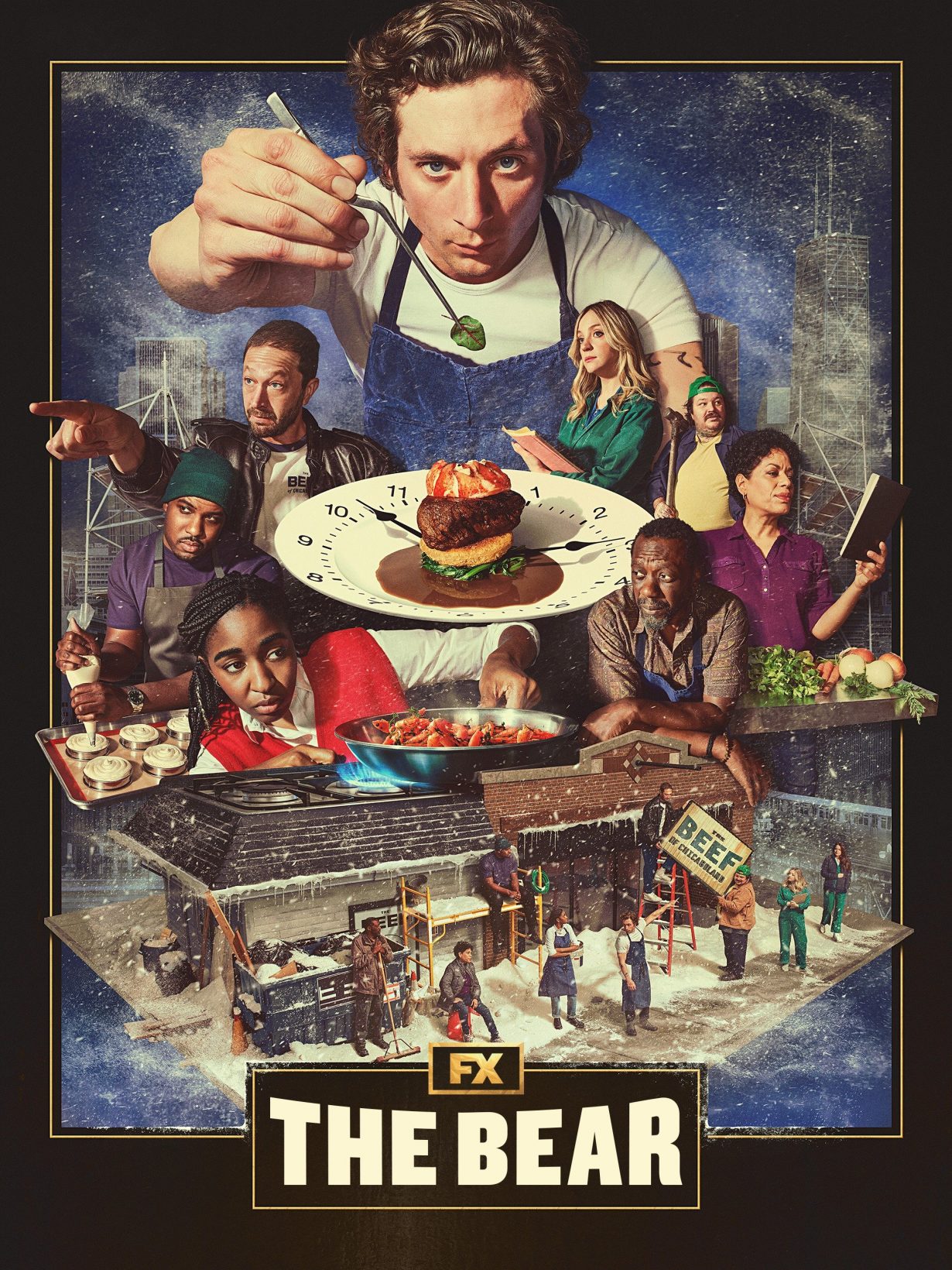Is it a success because it stimulates our hibernating palates, or have we been seduced into enjoying what is little more than our just deserts?
According to the film critic A.S. Hamrah, television is inherently mindless. A stream of replaceable, empty nonsense: ‘It’s all eating in restaurants, driving cars, looking at computer screens’. Despite the closeness of this description to the contents of FX’s series The Bear (2022–), critics responded to the show’s second series as though its streams of culinary imagery were somewhat more cerebral. The Bear is not to be binged – it is prestige dining, to be masticated slowly. Why, then, I wondered this summer, did I nonetheless binge it steadily to the point of my own gelatinisation? How could I so easily enjoy what was seemingly supposed to challenge my overcoddled brain?
The answer might at first seem obvious, given, after all, this is a show about chefs – classically entertaining, delectable, if you will. For those who have to date remained pure, The Bear follows Carmy, an Italian-American masterchef, as he returns to his hometown of Chicago to head up his family’s neighbourhood sandwich joint. Barrelling into The Original Beef fresh from a fancy career in New York, where he worked in what seems to be accepted as The Best Restaurant in the World, Carmy spends season one mostly annoying the café’s staff by failing to keep it real. By season two he has won them all over, and an unexpected windfall sees both him and his newly ambitious colleagues attempt to transform The Original Beef into The Bear, a fine-dining restaurant for the likes of a more discerning clientele. Gone will be the fat, tasty sandwiches, soaked in gravy and rich with grease; in will be a potpourri of gimmicky riffs on tradition, styled with tweezers.
The Bear, to some extent, has managed to remain your typical Show About Chefs – a thrilling cascade of stoveside brutality sweetened with doughnuts and love. To watch is to experience that familiar cycle of hot cortisol baths, cooled by generous scoopings of comedy and palate-cleansing food porn. There remains the requisite bunch of Olympically self-serious cooks yelling decontextualised nouns and prepositions over each other; there are still, in season two, the sparkling shots of salt-studded dough and emulsion-swaddled spaghetti.

But the doughnuts are now microscopic, the pizza encoded with ‘basil gel’; there is so much indecipherable green in basically every dessert. Concurrently, the kitchen clamour is periodically hushed, punctured by wordless gestures of mutual understanding and respect. Here we find the novelty at the heart of The Bear season two – the nub of sophistication that sent the critics wild. The more hybrid the cuisine, it would seem at least, the subtler the message. No longer are these chefs just trying to make a buck, nor (in Carmy’s case) tending raw ambition. These are artists attempting a subtle marriage of entrepreneurship and heart.
Central to The Bear’s most recent instalment are two nice ideas: that ambition need not savage human relations; that feeding the rich need not be a fundamentally elitist pursuit. Sure, Carmy and his chef-de-cuisine, Sydney, are determined to acquire ‘a Star’ for their new venture, but only one little Star, which will apparently keep them ‘low to the ground’. When Richie, who will work front-of-house at The Bear, is sent in preparation to do work experience at the Best Restaurant in the World, his scepticism as to why he must polish forks ’til he practically bleeds is softened by a lecture in the value of ‘acts of service’. His manager has learned the requisite wisdom via the process of getting sober. “I just like being able to serve other people,” he explains, comparing this to working in a hospital. “Restaurants and hospitals use the same word”, he declares to settle the absurdity: “hospitality”. Richie is silenced.
Is there not an important difference, we might wonder, between service and care? Perhaps not, in a world where even healthcare is privatised, turning hospitals into service providers catering only to those who can afford to pay. Yet The Bear’s star chefs and their lackeys persist in attempting to convey the idea that what drives them is more than the bounty and prestige that collects around cash. “Every night you make someone’s day,” claims the three-starred restaurant’s maître d’, referring to whichever unlikely customer that night has been saving up for years for the occasion. It is strange that the justification for one’s entire career should be precisely the exception to its rules. Not content to make an art out of feeding normal people as a matter of course, these chefs must get their thrills from patronising those rare and pitiable normals who dare to lurk among celebs.
A corrupted discourse of ‘care’ has left us unable to distinguish between different kinds of feeding – between nourishing those around us and serving those who have paid; between nourishing each other and exploiting each other’s love. It is a cloudy kind of care that makes a man polish forks for days in the name of ‘respect’; that has us refer to our colleagues as ‘family’ but disown them when we find them with drugs. It is telling that The Bear’s refrains around teamwork and respect are frequently traceable to military authorities, as though war – a refuge from the market after all – were truly a site in which all was fair and, truly, as the saying suggests, adjacent in some way to love.
Much as we might thrill to the notion that The Bear is out to nuance our perception of the service economy, it, like so many art objects to reach our senses via Disney+, was of course itself made for a subscription service. ‘Streaming’, writes Hamrah, ‘is a utility. Television is an appliance.’ We wanted to hold up this show as an artful riposte to such sweeping statements. And yet, it has been crafted precisely to appease our most predictable appetites – our simple yen for the aesthetics of a bumpy arc towards being ‘the best’. It is difficult not to enjoy a helping of The Bear, yet hard to feel sated by the whole. It is hard to be nourished by afterthoughts, humanist ‘profundities’ heaped on greed. It is easy, however, given the palatable glamour of it all, to feel we have been given what we want. It is easy enough to see we have been well and truly served.
